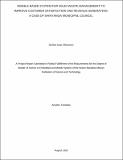| dc.description.abstract | Solid waste management has recently reached the top of the priority list in the modern world,
but solid waste disposal practices are often neglected. In addition, managing municipal solid
waste is one of the most challenging municipalities in Tanzania. Municipalities in Tanzania are
responsible for the management of solid waste in their cities, but they have significant obstacles
to providing a system that meets the needs of customers and improving revenue collection using
the electronic payment system. This study determined the efficacy of solid waste management
systems in Shinyanga municipality in customer dissatisfaction with waste collection service and
unfriendly revenue collection. The objective of this study was to analyze the current waste
collection system to determine the strength and weakness of the method used by solid waste
generators and collectors to access the solid waste collection service, their willingness to pay
for the service, municipal officials to manage revenues and complaints, and the participation of
political leaders in offering cooperation. The analysis was to identify the requirements for the
development and validation of the mobile-based system to improve customer satisfaction and
increase revenue collection. The study used a mixed method approach, which included
quantitative and qualitative data collection techniques to collect primary data with two sampling
techniques, purposive sampling and multistage sampling. The developed mobile application
adopted the evolutionary prototyping steps from the software development life cycle to
implement all modules of the mobile application by allowing iteration of the development
phases to ensure that user requirements are satisfied. The developed mobile based system was
evaluated by the technical and end-user on the availability, scalability, user friendliness,
consistency, navigation, feedback, performance, and security at both levels of. Although the
results from the 10 ward areas indicate that 57% have access to solid waste collection services
and collection is carried out daily at 31%, while two-thirds expressed dissatisfaction with the
current waste collection system, the results after validating the developed mobile app show that
the majority (85%) are willing to use the developed mobile app because it is useful to them
since their negative emotions associated with solid waste collection were resolved, such as
waiting for a waste collector for an extended period, paying informal waste collectors who
increase waste collection costs, and being charged without receiving service, as they already
felt overcharged. The study proposes a mobile application for solid waste management that will
be used at and outside the Shinyanga Municipal Council for customer satisfaction and revenue
growth. | en_US |

